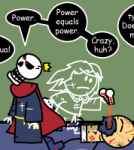From what I recall, the association between police and donuts is that police are often required to patrol overnight, and donuts (and coffee) were often available at such hours. Their abilities would diminish if they didn't have access to donuts (and coffee).
Choosing to wear armor, rather than not, is optimization. It's all just a matter of degree. The major difference between the real world and the game world is that the game world appears to run on simplified physical laws such that it's much easier to optimize. That, and the player gets to decide on random genetic factors and background elements for their character, which are well beyond what anyone in the real world can arrange for themself.
I'm not really concerned about that, though. I'm more concerned with the player making decisions as their character would - whoever that character may happen to be. I actually have somewhat of a preference for random character creation, specifically for that reason.




